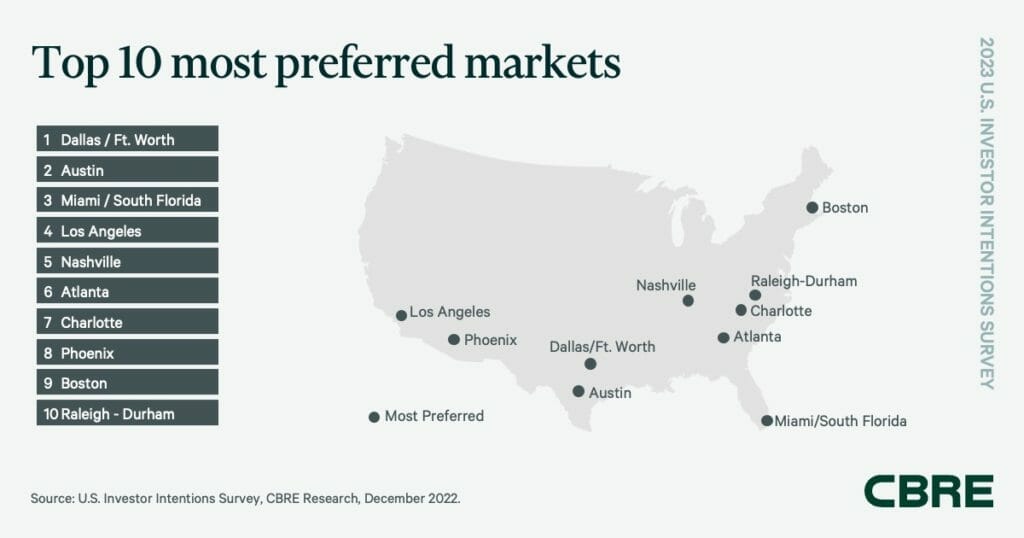A recent survey of commercial real estate investors ranked Phoenix as a top 10 target among U.S. metros. Phoenix ranks No. 8 among the Top 10 most preferred markets, according to CBRE’s 2023 U.S. Investor Intentions Survey.
READ ALSO: Ranking Arizona: Top 10 best places to live for 2022
The survey found that more investors are prioritizing high-performing secondary markets in 2023 (as opposed to gateway markets), particularly those with strong job and population growth prospects, which can translate into greater potential for both equity and income growth. Sun Belt markets are the most appealing: Dallas is the top preferred market, followed by Austin.
“Phoenix is well-positioned to sustain positive economic growth through 2023 and 2024,” said Asher Gunter, Vice Chairman based out of CBRE’s Phoenix office. “Phoenix’s high quality of life remains relatively affordable compared to most western markets, which continues to drive in-migration and high employment growth throughout the metro. Phoenix added almost 90,000 jobs annually in November 2022 and large, high-profile job announcements position the region’s diverse employment base to continue growing and drive future demand for multifamily housing.”

Commercial real estate lenders are also bullish on high-growth secondary markets. Sun-Belt markets are favored among lenders with Miami the top preferred market, followed by Raleigh-Durham.
“The Greater Phoenix region continues to prove that Phoenix is one of the strongest markets in the country,” said Bruce Francis, Vice Chairman in CBRE’s Phoenix Office. “Phoenix offers a diverse business economy with sectors including aerospace, technology, agriculture, tourism and active semiconductor industry. Thanks in part to the largest foreign direct investment in the U.S. by the Taiwan Semiconductor Manufacturing Company’s (TSMC) facility in North Phoenix, the Valley is set to be the top semiconductor region in the country once TSMC is up and running. This will only help to expand the Valley’s already growing population.”
Other Key Findings from the 2023 Survey (conducted in December 2022):
- Investors cite rising interest rates, a potential recession and limited credit availability as their greatest challenges this year.
- More than half of investors expect to decrease purchasing activity in 2023 compared with 2022 levels. Amid lower pricing dynamics, 60% of respondents say they will either sell less than last year or not sell at all.
- The most sought-after sectors remain multifamily, particularly apartment complexes, and industrial, led by modern logistics facilities in major markets. Grocery-anchored centers are the most popular subsector for retail investors, while office investors largely prefer Class A assets in prime locations.
- More investors will implement opportunistic and debt strategies than last year because of attractive returns amid higher interest rates and tighter financial market conditions.
- While investors remain committed to environmental, social and governance criteria (ESG), nearly half of respondents say that the worsening economic outlook will limit the extent to which they consider ESG criteria in their investment decisions.




